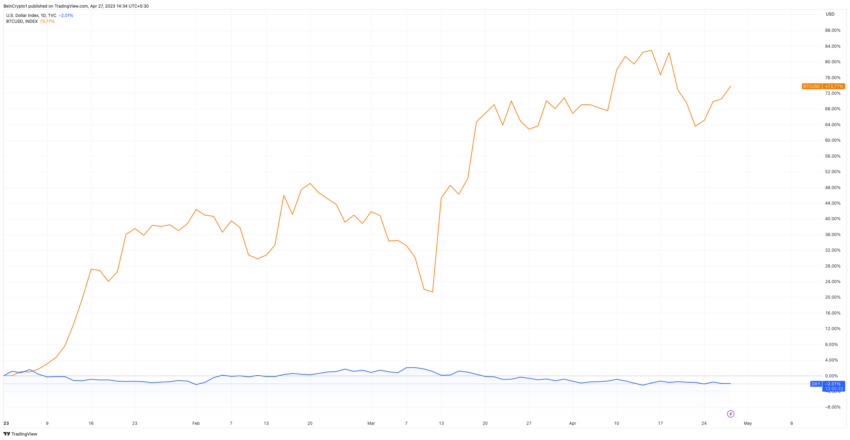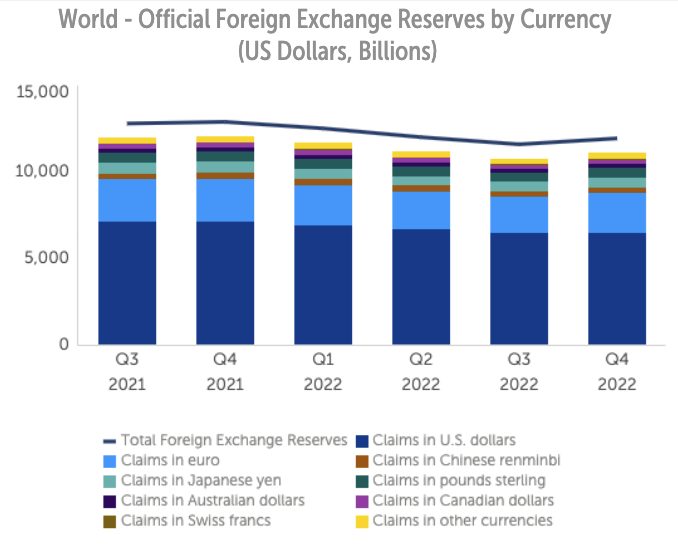Political turmoil and the growing popularity of cryptocurrencies have shaken the US dollar’s dominance in the global financial system. The recent debt ceiling crisis exposed the fragility of the US economy, prompting a search for alternatives to the dollar. This has led to an increased interest in Bitcoin as a potential store of value and medium of exchange.
During the crisis, investors flocked to Bitcoin, drawn to its decentralized nature and limited supply. It proved to be a safe haven asset, with its price soaring as the dollar’s value faltered. The incident sparked a larger conversation about the dollar’s role in the global economy. Many experts question its long-term viability as the world’s primary reserve currency.
Central Banks Exploring Digital Currencies
The US dollar’s decline has led to the rise of Bitcoin as more investors consider it a viable alternative. With a limited supply of 21 million coins, Bitcoin’s scarcity makes it an attractive store of value.
As the US dollar continues to weaken, Bitcoin may continue to gain momentum in the global financial market.

In response to Bitcoin’s growing popularity, central banks worldwide have started to explore the development of their digital currencies. Known as central bank digital currencies (CBDCs), these aim to provide a more efficient and secure form of payment while maintaining control over monetary policy.
China’s digital yuan, for example, is already in the advanced stages of development and testing. The European Central Bank is also considering the launch of a digital euro. Meanwhile, the US Federal Reserve has initiated research on a potential digital dollar.
The rise of CBDCs could further challenge the US dollar’s dominance. Countries may look to reduce their reliance on the greenback.
The development of CBDCs also presents an opportunity for Bitcoin to solidify its position in the global financial landscape.
As central banks work to create digital currencies, the demand for decentralized alternatives like Bitcoin is likely to increase. This could further drive its adoption and strengthen its role in the global economy.
Cryptocurrencies and the Shift in Global Reserve Currencies
The growing interest in digital assets has sparked a shift in the global reserve currency landscape. As countries explore the adoption of CBDCs and the use of Bitcoin, the US dollar’s role as the world’s primary reserve currency is increasingly under threat.
One potential outcome of this shift is the rise of a multipolar reserve currency system. Several major currencies, including the digital yuan, euro, and Bitcoin, share the role previously held exclusively by the US dollar. A long-time currency analyst at Deutsche Bank said,
“The money printing, with its overt seigniorage extraction and inflation repercussions, has only further encoraged those in the developing world that want to establish a multipolar currency system more in keeping with their growing share of glabl GDP.”

This scenario would have significant implications for the global financial system. It could lessen the impact of US monetary policy on other economies and increase the importance of digital assets in international trade and finance.
Bitcoin’s growing influence in the global economy cannot be ignored. The US dollar faces challenges from rival nations and cryptocurrencies.
The world may be witnessing the beginning of a new era in global finance—one in which Bitcoin plays a central role.
Bitcoin’s Role in International Trade
As the world moves toward a more digitized financial system, Bitcoin is well-positioned to play a vital role. Its decentralized nature, borderless transactions, and ability to bypass traditional banking systems make it an appealing option for global commerce.
Countries with unstable local currencies, such as Argentina and Venezuela, have already started to adopt Bitcoin for cross-border transactions. This adoption allows them to circumvent the limitations imposed by their domestic currencies while avoiding the volatility associated with the US dollar.
“Every night I ask myself why all countries have to base their trade on the dollar,” Brazilian President Lula da Silva said in a speech at the New Development Bank in Shanghai.
“Why can’t we do trade based on our own currencies?” President Lula added.
As more nations embrace digital currencies, Bitcoin could become essential to international trade.
Furthermore, Bitcoin’s underlying technology, blockchain, offers unparalleled transparency and security. This can streamline the trade process and curb the risk of fraud.
The distributed ledger technology enables all parties involved in a transaction to have access to a shared, immutable record, fostering trust and efficiency.
Implications for the US Dollar and the Global Economy
The rise of Bitcoin and other digital currencies presents significant challenges for the US dollar and the global financial system. As countries explore alternatives to the dollar-based system, the greenback’s dominance as the world’s primary reserve currency may diminish.
This potential shift in the global financial landscape could lead to a more balanced distribution of power and influence among major economies. The United States may no longer hold a monopoly on global monetary policy, and nations could have greater autonomy in managing their economic affairs.
In the long run, the rise of Bitcoin and other digital currencies could foster a more inclusive and resilient global economy. As more people gain access to financial services through digital assets, economic growth and development may become more widespread and sustainable.
Bitcoin’s growing prominence as an alternative to the US dollar signifies a potential turning point in the global financial landscape. As the greenback faces mounting challenges from rival currencies, political turmoil, and the rise of digital assets, Bitcoin could play a crucial role in shaping the future of global finance.
Disclaimer
Following the Trust Project guidelines, this feature article presents opinions and perspectives from industry experts or individuals. BeInCrypto is dedicated to transparent reporting, but the views expressed in this article do not necessarily reflect those of BeInCrypto or its staff. Readers should verify information independently and consult with a professional before making decisions based on this content. Please note that our Terms and Conditions, Privacy Policy, and Disclaimers have been updated.



